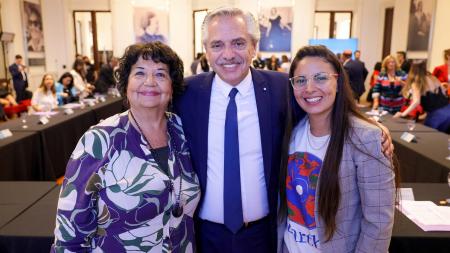President Alberto Fernández highlighted the commitment to “End inequality, reaffirm freedom and put effort into changing the culture that discriminates”leading this Friday the fourth meeting of the National Cabinet for the Mainstreaming of Gender Policiesaccording to official sources.
The meeting, which was also attended by members of the Cabinet responsible for gender areas from different ministries and organizations, was held this Friday at the Salón de las Mujeres Argentinas del Bicentenario de Casa Rosada and Fernández was accompanied by the Minister for Women, Gender and Diversity, Ayelén Mazzina.
Among other points, the meeting marked the advances in the institutional framework and mainstreaming of the gender and diversity perspective of the ministries and agencies that make up the cabinet.
“We have to work every day so that there is more democracy, so that there is a better Republic and that means making more egalitarian institutions and giving more freedom”Alberto Fernandez
“We held this meeting to multiply our commitment to end inequality and reaffirm freedom and respect in diversity,” said the president, while assuring that one of the National Government’s priorities is “to change the culture that discriminates, the culture of abuse.
“We have to work every day so that there is more democracy, so that there is a better Republic and that means making more egalitarian institutions and giving more freedom,” added Fernández.
In the same sense, Mazzina, highlighted “the political will of a National Government that understands that inequality gaps narrow with a State present” and affirmed that this is also reflected in the numbers of the National Budget, which point to that line.
For her part, the president of the Ad Honorem Advisory Council of the Ministry of Women, Gender and Diversity, Dora Barrancos, stated that she was convinced that “this coming stage will be remembered as one of promotion, finally of social justice with gender justice.” .
Meanwhile, the Minister of Foreign Affairs, Santiago Cafiero, highlighted the role in his portfolio of Alba Rueda as Special Representative on Sexual Orientation and Gender Identity and remarked that “Argentina is one of the five countries that has a special representative for the LGBTI+ collective.”
In turn, the Minister of Social Development, Victoria Tolosa Paz, highlighted the growth of the budget allocated to the Potenciar Trabajo plans for 2023, due to its role in reducing inequalities for the poorest women.
The head of the Culture portfolio, Tristán Bauer, highlighted the fact that the meeting was held in the Salón de las Mujeres Argentinas del Bicentenario, inaugurated in 2009 by the then president and current vice president Cristina Fernández de Kirchner.
Also present were, among others, the Ministers of Health, Carla Vizzotti; and from Public Works, Gabriel Katopodis; the head of the Advisory Cabinet Unit of the Cabinet Office, Martín Yañez; the Undersecretary of Political Affairs of the Nation, Victoria Tesoriero; and the Undersecretary for Political and Institutional Coordination of the Chief of Staff, Antonia Portaneri.
The National Cabinet for the Mainstreaming of Gender Policies was created by presidential decree in August 2020 with the objective of incorporating the gender perspective in all the public policies of the national State.
But, in addition, it undertakes to coordinate and agree on the commitments of each ministry in terms of gender, articulate joint strategies for monitoring compliance and develop training and specialization actions in each area to ensure the mainstreaming of this perspective in the orbit of your competition.
In terms of recognition of LGBTI+ rights, Argentina was a pioneer by enacting Law 26,618 on Equal Marriage in 2010 and, in 2012, Law 26,743 on Gender Identity, which recognizes the self-perceived gender identity of each person and their right to decent treatment, regardless of the sex assigned at birth and their identification records
In that framework, Argentina signed the first global instrument specifically for the protection of women’s human rightsthe Convention on the Elimination of All Forms of Discrimination against Women (Cedaw) and granted it constitutional status, as well as the first treaty that specifically addresses the issue of gender-based violence that is the Inter-American Convention to Prevent, Punish and Eradicate Violence against Women (Convention of Belém do Pará).
Likewise, laws were approved that consolidate Argentina as a country with a regulatory framework that widely protects the rights of women and LGBTI+.
In 2006, Law 26,510 on Comprehensive Sexual Education was enacted., which establishes the right of all students to receive comprehensive sexual education in public, state-run and private educational establishments; and in 2009, Law 26,485 on Comprehensive Protection to Prevent, Punish and Eradicate Violence against Women in the areas in which they develop their interpersonal relationships.
In terms of recognition of LGBTI+ rights, Argentina was a pioneer by enacting Law 26,618 on Equal Marriage in 2010 and, in 2012, Law 26,743 on Gender Identity, which recognizes the self-perceived gender identity of each person and their right to decent treatment, regardless of the sex assigned at birth and their identification records.
Besides, Law 27,412 on Gender Parity in Areas of Political Representation -2017- constitutes another advance to reduce the gaps that sustain inequalities based on gender.
And finally, in 2018, Law 27,499, known as the Micaela Law, establishes mandatory training on gender issues and gender-based violence for all people who perform public service at all levels and hierarchies in power. Executive, Legislative and Judicial of the Nation.











